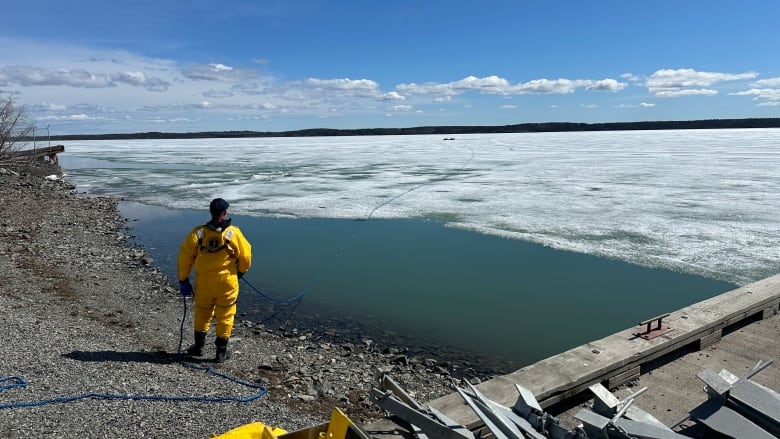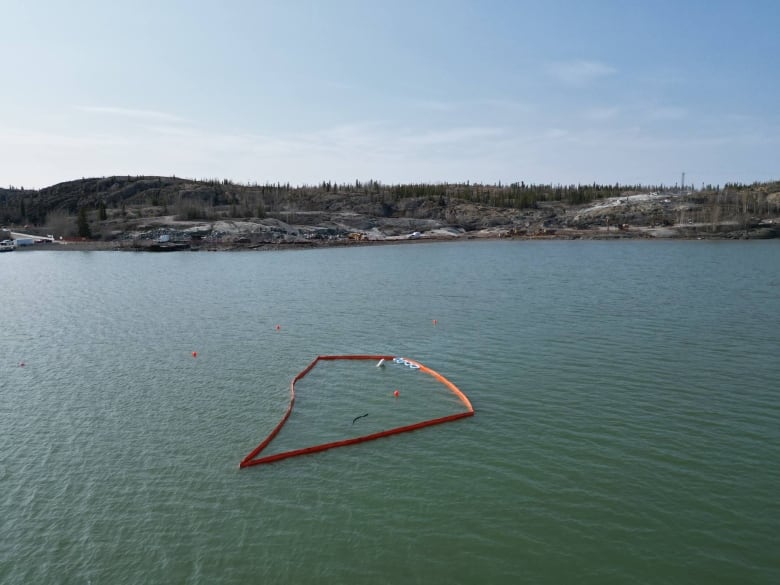Coast guard still seeking contractor to recover boat that sank in Yellowknife's Back Bay 3 months ago
Coast guard paying for the clean up and not laying fine after weighing factors of case

The Canadian Coast Guard is still looking for a contractor to haul out of the water a 40-foot steel boat that sank in Yellowknife's Back Bay in the spring.
Neil Woledge, a Yellowknife man, said he owns the fishing vessel. He said he's left it on the lake for two winters without incident, but trouble struck last winter.
As the ice broke up, it managed to push open a seal along the shaft allowing water inside and "down it went," he said. Woledge believes the boat wouldn't have sunk if its transmission had been replaced, as he'd planned.
A spill report filed to the N.W.T. government says the boat sank on May 12.
The Canadian Coast Guard said no one was on the vessel at the timeand although it doesn't know exactly what was on the boat when it went down,it's taken "standard measures" to address pollution.

Oiled debris was removed from the bay while it was still covered in ice, and a containment boom has been placed around it, a spokesperson said in an email earlier this month. The coast guard says italso used sorbents a substance that collects oil molecules to help with the clean up.
"Only minimal quantities of pollution have been observed following the initial recovery of oiled debris from the ice-covered bay," the spokesperson said. "This pollution is believed to have been successfully captured within the established containment area."
Recovery operation a challenge
CBC News asked the coast guard whether there are penalties associated with sunken boats. In an initial emailed response, it said it "works with vessel owners to address their problem vessels."
In an email on Thursday morning, received after publication time, the coast guard said it could lay a fine under the Wrecked, Abandoned and Hazardous Vessels Act but chose not to after "weighing all the factors" in the case. It also said it was paying for the clean up.
"We deemed the vessel owner unable to address the problem vessel and stepped in to take the required actions to mitigate the risks posed to the environment and to navigation," it said.
Earlier this month, the agency said it was "optimistic" it could get the boat out of the water this summer.
"Timelines remain fluid, due to the challenges associated with securing a contract to complete the marine salvage," the spokesperson said.
"The project requires specialized technical services, including a team of commercially trained divers, and heavy equipment to safely and effectively complete the operation."

In an email on Tuesday, another coast guard spokesperson confirmed the agency was still looking for someone to do the work, and that the vessel remained in a "stable position."
Woledge said another factor complicating the clean up is contaminated soil at the bottom of the bay. He said that's why the boat can't be dragged out of the water instead. He said the plan wasto lift it, put it on a barge, and bring it to a property he owns.
He also said the coast guard hadn't spoken to him about how the operation would be paid for.












_(720p).jpg)


 OFFICIAL HD MUSIC VIDEO.jpg)
.jpg)



























































































